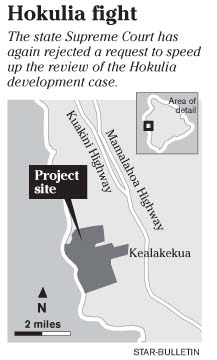Court refuses quick
ruling on Hokulia
HILO » The state Supreme Court has again turned down a Hawaii County request to speed up a review of the controversial Hokulia case in Kona.
 In 2003, Circuit Judge Ronald Ibarra ruled that Hokulia was an urban project being built illegally on agriculturally designated land. Developer 1250 Oceanside Partners and Hawaii County, which granted the permit for the project, appealed to the Supreme Court.
In 2003, Circuit Judge Ronald Ibarra ruled that Hokulia was an urban project being built illegally on agriculturally designated land. Developer 1250 Oceanside Partners and Hawaii County, which granted the permit for the project, appealed to the Supreme Court.
The high court had turned down a previous request for speedy consideration, meaning there might be no final ruling for four or more years, said county attorney Ivan Torigoe.
That leaves Hawaii County in an "impossible dilemma" about how to administer existing land-use laws, Torigoe said.
It also leaves the county open to a lawsuit threatened by about 150 Hokulia lot owners who want compensation because the lower court banned construction.
The lot owners say the mess is the county's fault, and demand $264 million, almost as much as the county budget for an entire year.
The law requires that housing on agricultural land be related to agricultural use. Developer Oceanside planned to do that, but in a minimal way.
Torigoe says Ibarra incorrectly added a requirement, not found in the law, that such agriculture must be economically viable.
Alan Murakami, attorney for Hokulia opponents, said the requirement for economic viability is reasonable, otherwise the law might have a "non-sensical" requirement for agriculture that is not viable.
Because of the differing interpretations, the county Planning Department now processes new subdivision proposals on agricultural land if the lots meet a minimum 1-acre requirement, but the county adds a disclaimer that owners and buyers should consult with their attorneys.
Subdivisions created on agricultural land before 1976 are not in legal danger since the Legislature did not link housing and agricultural activity before that, county Planning Director Chris Yuen said.
Some new subdivisions are avoiding problems by asking the state Land Use Commission to change the designation of agricultural land. For example, Big Island Country Club Homes LLC wants its 402 acres at Puuanahulu, North Kona, designated "rural."
E-mail to City Desk
[News] [Business] [Features] [Sports] [Editorial] [Do It Electric!]
[Classified Ads] [Search] [Subscribe] [Info] [Letter to Editor]
[Feedback]
